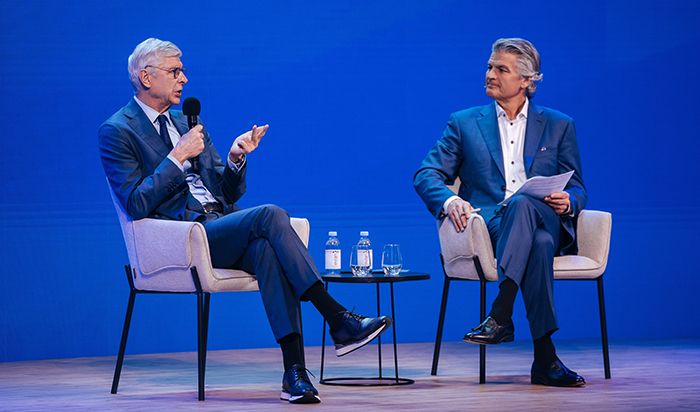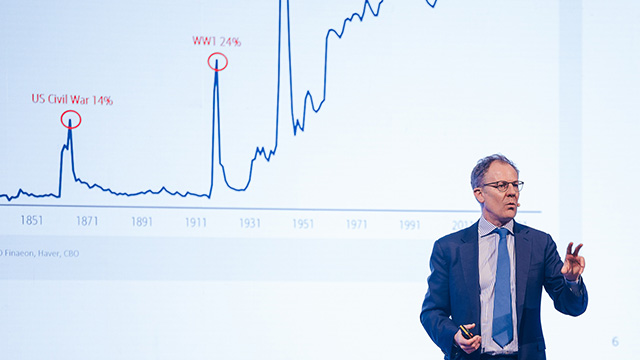Lessons in leadership, from a master of sporting success

Arsène Wenger, OBE, Chief of Global Football Development at FIFA
David Tyrie, President, Marketing, Digital and Specialized Consumer Client Solutions at Bank of America
Key takeaways
- Among the prominent speakers at Bank of America’s Global Investor Summit 2025 in Dubai was sporting legend Arsène Wenger
- Wenger shared reflections on leadership drawn from a celebrated career as a player and manager in Europe’s top football leagues, and his current role as FIFA’s Chief of Global Football Development
- Experiences garnered from the field of sport have much to teach leaders and organisations attempting to navigate an environment of heightened uncertainty
Whether you call it soccer or football, the world’s most popular team sport is a theatre of intense competition, extreme pressure and exceptional performance. There was therefore keen interest when Arsène Wenger, one of the sport’s most celebrated managers, joined the BofA Global Investor Summit 2025 in Dubai to share insights with delegates from across the worlds of business, technology and investment on how to lead, and maintain speed and fluidity, in a period of rapid economic and geopolitical change.
Today, Wenger serves as Chief of Global Football Development for FIFA, the sport’s governing body and the organisers of the 2026 World Cup, of which Bank of America is the first-ever bank sponsor.1 It is a fitting post for a man best known for his two decades as head coach and manager of Arsenal FC (1996-2018), when he nurtured the London club through the most successful period in its history amid a legendary rivalry with Sir Alex Ferguson’s Manchester United.
The words ‘coach’ and ‘manager’ are often used interchangeably in sport, but speaking to David Tyrie, President, Marketing, Digital and Specialized Consumer Client Solutions at Bank of America, Wenger made a distinction between the positions, which he views as defined by different skill sets and time horizons.
"A manager is somebody who takes care of the structure of the club, develops the brand, tries to prepare for the long term,” he told Tyrie. “But a coach is somebody who inspires people, who motivates people, and who thinks about the short term.”
In Wenger’s view effective leadership must combine elements of both these roles. “To take care of the long term, you have to do well in the short term," he said.
In the coaching role, the key commodity is trust, he said, which in turn relies on three attributes — expertise, consistency and, surprisingly, intimacy. “If you don't have the capacity to connect individually with people, you'll never be a manager," Wenger explained.
The ability to forge individual connections is vital because leaders must make the most of the particular skills and talents of each member of their teams. “Every person is different,” he said. “To develop talent you need to know who is in front of you. I always looked out for one dominant quality — because none of us have all the qualities — and to improve it. In our job, this observation quality is very important.”
Wenger also reminded the audience at the Global Investor Summit that ultimately it is leaders who will be held accountable for the decisions they make – and in an era of information overload, this fact should remain in the front of their minds.
“Trust your eyes, not your ears,” he advised. “In our job, everybody has opinions, but at the end of the day, you make the decision. You have to trust what you see and resist all the noise around you."
Cultivating future talent – wherever it lies
A notable strength of Wenger’s career was his ability to nurture multiple generations of talent, which kept his teams competing with the best for decades at a time. His priority today remains developing the next generation of footballers worldwide, wherever they might live.
The ‘beautiful game’ has long been associated with raw individual skill, but according to Wenger other factors have eclipsed this.
“The 20 best countries in the world are the 20 that have the best ability to identify talent, the best development programmes, and the highest quality of coaches, competition and integration,” he said. For this reason, Wenger’s focus is on opening football academies in more countries, to ensure that local talent finds a route forward. Some 60 countries are now equipped with such facilities.
He highlighted the United States as a place that could do more to develop football at the grassroots level, particularly by reducing reliance on fee-paying private academies. Stronger clubs, and better free-of-charge access to qualified coaches, is crucial to expanding the pool of up and coming players not just in the U.S., but around the globe.
Bank of America’s Tyrie predicted that the way Wenger defends values such as accessibility and inclusion could be his most lasting legacy, eclipsing even his numerous other achievements on and off the pitch. Wenger’s wisdom was also a pertinent reminder that in a world undergoing considerable change, the mark of truly great leadership is the ability to foster a pipeline of talent capable of adapting, and standing the test of time.
1Bank of America Newsroom ‘FIFA announces Bank of America as Official Bank Sponsor of FIFA World Cup 26™’ August 2024
War, peace and populism: Looking for opportunities in a new geopolitical era
As the global political and economic order undergoes a fundamental realignment, investors will need to develop a new playbook.


